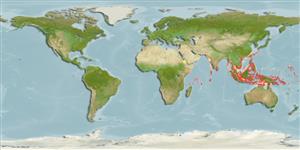Common names from other countries
>
Eupercaria/misc (Various families in series Eupercaria) >
Gerreidae (Mojarras)
Etymology: Gerres: Latin, gerres = a kind of anchovies; cited by Plinius.
More on author: Bloch.
Environment: milieu / climate zone / depth range / distribution range
Ecologie
marien; brak water rifbewoner; oceanodroom (Ref. 51243); diepte 1 - 40 m (Ref. 1602). Tropical; 26°C - 29°C (Ref. 4959); 30°N - 12°S
Indo-West Pacific: Madagascar to Australia. Reported from Vanuatu (Ref. 13300). Larvae reported in Japan as Gerres abbreviatus (Ref. 9902).
Grootte / Gewicht / Leeftijd
Maturity: Lm ? range ? - ? cm
Max length : 30.0 cm TL mannelijk / geslacht onbekend; (Ref. 12915); common length : 25.0 cm SL mannelijk / geslacht onbekend; (Ref. 37816)
Dorsale stekels (totaal): 9; Dorsale zachte stralen (totaal): 10; Anale stekels 3; Anale zachte stralen: 7. Body silvery with indistinct fine dark stripes along scale rows above and 4-6 rows immediately below lateral line (apparent in newly preserved specimens; larger fishes). Body deep, depth max 1.9-2.3 in SL. Dorsal fin 2nd spine longer than 3rd; anal fin 2nd spine long and robust; caudal fin short and deeply forked; pectoral fins reaches beyond level of anal fin. No scales on upper preopercular flange in approximately 10 cm SL specimens; 1-5 scales (usually 2-3) in over 16 cm SL specimens. Scales between 5th dorsal fin spine base and lateral line 3.5-4.5 (Ref. 28029, 90102). Supraneural bones 3 (Ref. 41102). Ventral and anal fins yellow with white tips Ref. 34765).
Marine species that enters estuaries and coastal lagoons in Madagascar (Ref. 4323). Forms schools on sandy bottoms (Ref. 12915, 48635). Small juveniles feed on zooplankton, larger fish feed on small polychaetes, bivalves, crustaceans and fishes (Ref. 3409). In Palau, spawners migrate from mangroves and sand flats to the outer reef edge around the full moon (Ref. 1602). Marketed fresh or made into fishballs (Ref. 12915).
Levenscyclus en paargedrag
Maturiteit | Voortplanting | Paaien | Eieren | Fecunditeit | Larven
Iwatsuki, Y., S. Kimura and T. Yoshino, 1998. Redescription of Gerres erythrourus (Bloch, 1791), a senior synonym of G. abbreviatus Bleeker, 1850 (Teleostei: Perciformes: Gerreidae). Copeia 1998(1):165-172. (Ref. 28029)
Status op de Rode Lijst van het IUCN (Ref. 130435)
CITES (Ref. 128078)
Not Evaluated
Gevaar voor de mens
Harmless
Gebruik door de mens
Visserij: van minder commercieel belang
Meer informatie
Lokale namenSynoniemenMetabolismePredatorenEcotoxicologieVoortplantingMaturiteitPaaienFecunditeitEierenOntwikkeling van de eieren
ReferentiesAquacultuurAquacultuurprofielKweeklijnenGeneticaElectrophoresesErfelijkheidZiektesVerwerkingMassaconversie
Tools
Speciale rapporten
Download XML
Internetbronnen
Estimates based on models
Preferred temperature (Ref.
115969): 25.2 - 29.1, mean 28.5 (based on 694 cells).
Fylogenetische diversiteitsindex (Ref.
82804): PD
50 = 0.5000 [Uniqueness, from 0.5 = low to 2.0 = high].
Bayesian length-weight: a=0.01202 (0.00897 - 0.01612), b=3.04 (2.99 - 3.09), in cm Total Length, based on LWR estimates for this species (Ref.
93245).
Trofisch niveau (Ref.
69278): 3.3 ±0.43 se; based on food items.
Weerstandsvermogen (Ref.
120179): Hoog, minimale populatieverdubbelingstijd minder dan 15 maanden (Preliminary K or Fecundity.).
Fishing Vulnerability (Ref.
59153): Low vulnerability (20 of 100).
